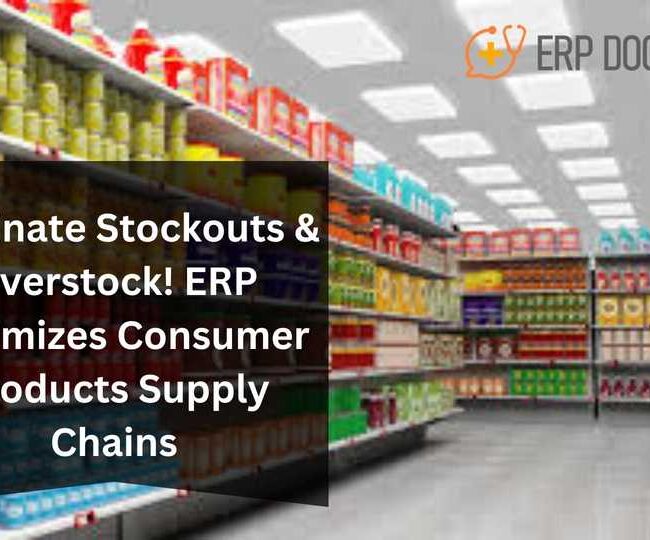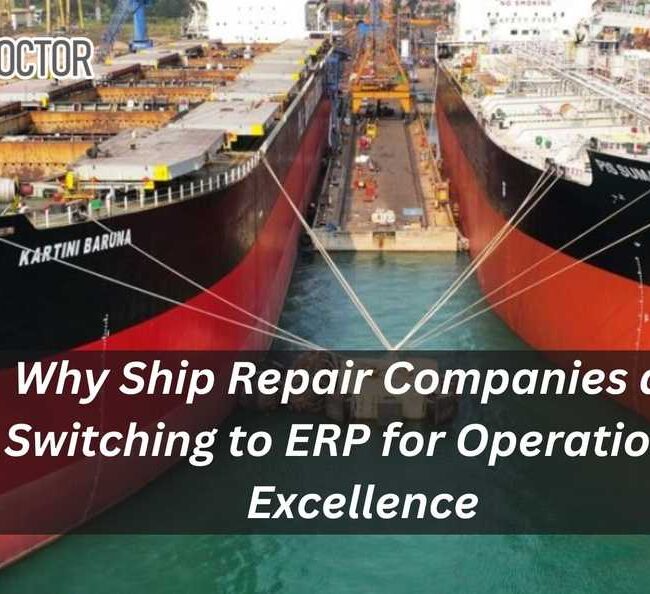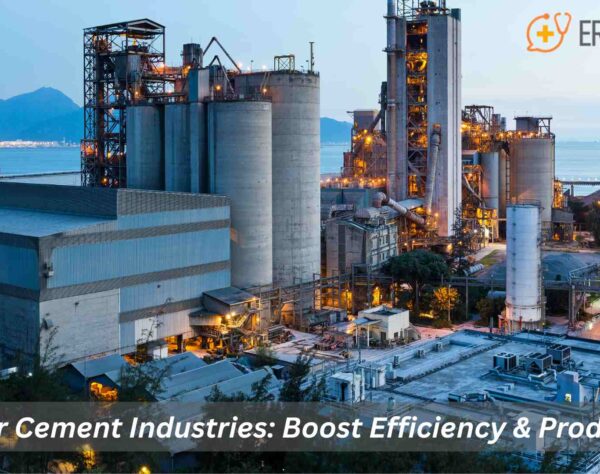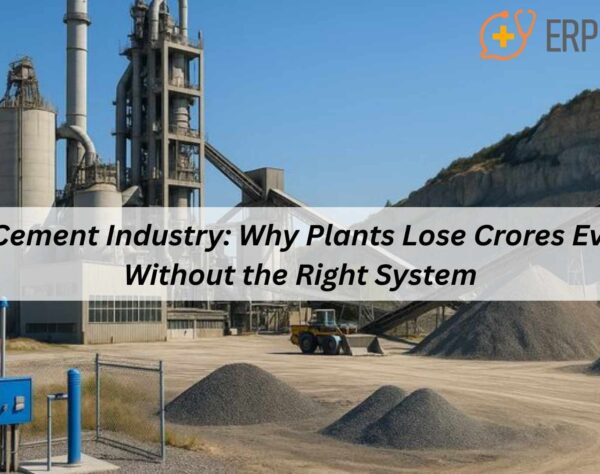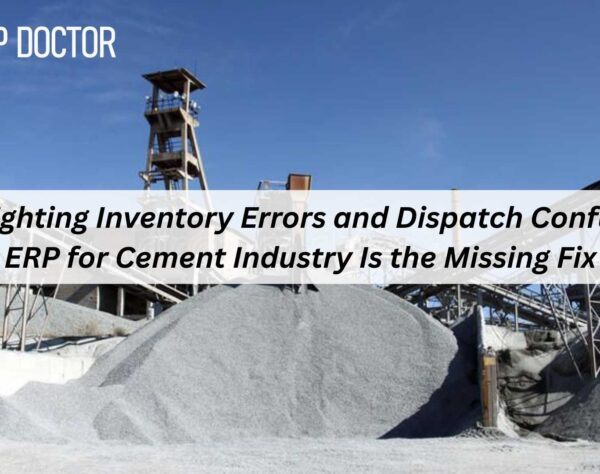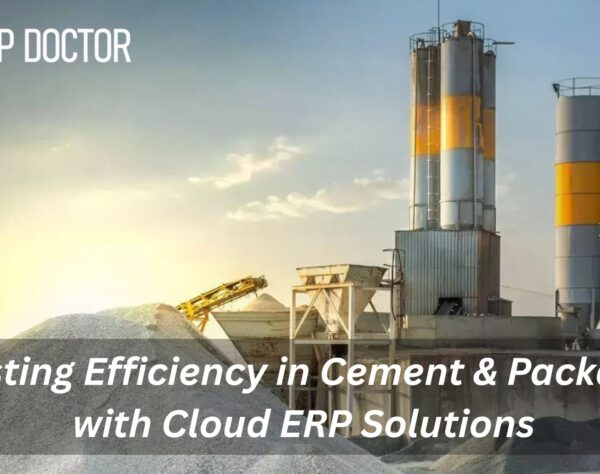
Struggling with Compliance & Reporting? ERP Makes Cement Manufacturing Easy

Optimizing Cement Manufacturing: Discover Power of ERP for Compliance & Reporting
In today’s rapidly evolving industrial landscape, cement manufacturers face a host of challenges—from maintaining strict compliance standards to generating accurate, real-time reports. Modern ERP systems are emerging as a game-changer for the cement industry, transforming complex operations into streamlined, efficient processes. In this blog post, we explore how ERP for cement Industry and tailored ERP solutions for Cement Industry can simplify compliance and reporting while boosting overall productivity.
Understanding ERP in the Cement Industry
Enterprise Resource Planning (ERP) is a comprehensive software platform that integrates various business processes into one unified system. For cement manufacturers, implementing ERP for cement Industry can mean:
- Centralized Data Management: Consolidate data from production, sales, inventory, and compliance into one reliable source.
- Real-Time Insights: Access up-to-date information that drives smarter decision-making.
- Process Automation: Automate routine tasks, reducing manual errors and freeing up staff for more strategic roles.
By using ERP, cement companies can break down silos, ensuring that every department—from procurement to production—is aligned with the organization’s goals.
Key Challenges in Cement Manufacturing
Cement production is inherently complex, and manufacturers face several critical challenges:
- Compliance and Regulatory Pressure:
Adhering to local, national, and international regulations can be daunting. Cement manufacturers must navigate environmental standards, labor laws, and quality control measures. - Reporting Complexities:
Accurate reporting is crucial for both compliance and operational efficiency. Manual reporting processes often lead to delays, errors, and misinterpretations of data. - Operational Inefficiencies:
Disconnected systems and outdated technologies can hinder the smooth flow of information, leading to inefficiencies and increased costs. - Demand Fluctuations:
Market demand for cement can vary, making it essential to have a flexible system that quickly adapts to production changes and inventory management.
Implementing ERP solutions for Cement Industry helps address these challenges by creating a robust framework for compliance, reporting, and overall operational excellence.
How ERP Solutions Simplify Compliance
Compliance is a major pain point for cement manufacturers. An ERP system offers:
- Automated Compliance Checks:
Regular audits and automated checks ensure that your processes align with industry standards, reducing the risk of non-compliance. - Real-Time Monitoring:
Keep track of key performance indicators (KPIs) and environmental metrics in real time. This proactive monitoring can help identify potential issues before they escalate. - Audit Trails and Documentation:
Detailed logs and reports generated by ERP systems make it easier to produce comprehensive audit trails. This transparency not only meets regulatory requirements but also builds trust with stakeholders.
With ERP for cement Industry, companies can seamlessly integrate compliance measures into their daily operations, reducing the administrative burden and ensuring that all regulatory requirements are met consistently.
Enhancing Reporting Accuracy with ERP
Accurate reporting is the backbone of informed decision-making in the cement industry. Here’s how ERP enhances reporting:
- Integrated Data Sources:
ERP systems combine data from multiple departments, providing a single source of truth. This integration eliminates data discrepancies and ensures consistency across reports. - Customizable Dashboards:
Modern ERP solutions come with intuitive dashboards that can be customized to display critical metrics such as production efficiency, resource utilization, and compliance status. - Automated Report Generation:
Save time and reduce errors by automating routine reports. This not only speeds up the reporting process but also provides real-time insights that are crucial during decision-making.
By choosing robust ERP solutions for Cement Industry, manufacturers can transform their reporting processes—turning raw data into actionable insights that drive growth and operational improvements.
Benefits of Implementing ERP in Cement Manufacturing
The adoption of ERP systems in the cement industry offers several tangible benefits:
- Improved Operational Efficiency:
Streamline processes and reduce redundant tasks, leading to faster production cycles and lower operational costs. - Enhanced Decision-Making:
Access to real-time data and comprehensive reports empowers management to make informed, data-driven decisions. - Better Resource Management:
Optimize the allocation of raw materials, labor, and machinery to maximize output and minimize waste. - Scalability:
As your business grows, ERP systems can scale with you, integrating new processes and technologies seamlessly. - Competitive Advantage:
By leveraging the full potential of ERP for cement Industry, companies can stay ahead of regulatory changes and market trends, ensuring long-term success.
Getting Started with ERP for Cement Manufacturing
Transitioning to an ERP system may seem daunting, but the process can be broken down into manageable steps:
- Assessment and Planning:
Evaluate your current processes and identify areas that would benefit most from automation and integration. - Vendor Selection:
Choose a reputable ERP vendor that specializes in solutions for the cement industry. Look for systems with proven track records in compliance management and reporting. - Implementation and Training:
Work with your vendor to implement the system and train your team. Effective training is crucial to ensure that all users are comfortable with the new processes. - Continuous Improvement:
ERP is not a one-time project. Regularly update and refine your processes to take full advantage of new features and technologies.
By following these steps, cement manufacturers can smoothly transition to a more efficient, compliant, and data-driven operation using ERP solutions for Cement Industry.
In the competitive world of cement manufacturing, staying ahead means embracing technology that streamlines operations, ensures compliance, and enhances reporting accuracy. ERP for cement Industry offers a comprehensive solution that addresses these challenges head-on. With benefits ranging from improved data management to scalable growth, ERP systems are not just an upgrade—they’re a strategic investment in the future of your business.
Cement Manufacturing ERP FAQs
1: What is ERP and how does it benefit cement manufacturers?
ERP (Enterprise Resource Planning) integrates all business functions—like production, sales, and inventory—into one system, making processes smoother and more efficient.
2: How does ERP help with compliance in the cement industry?
ERP systems automate compliance checks, provide real-time monitoring, and create detailed audit trails to ensure that manufacturing processes meet regulatory standards.
3: In what ways does ERP improve reporting accuracy?
By centralizing data from various departments, ERP eliminates manual errors and offers customizable dashboards and automated reports, resulting in more accurate and timely insights.
4: What are the key benefits of implementing ERP solutions in cement manufacturing?
Implementing ERP leads to streamlined operations, better resource management, improved compliance, and enhanced decision-making through real-time data and reporting.
5: How do I choose the right ERP system for my cement business?
Start by assessing your current processes, then look for an ERP vendor with industry expertise, robust compliance features, and strong support and training services to ensure a smooth implementation.
By adopting tailored ERP solutions for Cement Industry, manufacturers can transform their operations, turning complex challenges into opportunities for innovation and growth. Embrace the change and let ERP pave the way for a more efficient and compliant cement manufacturing process.


